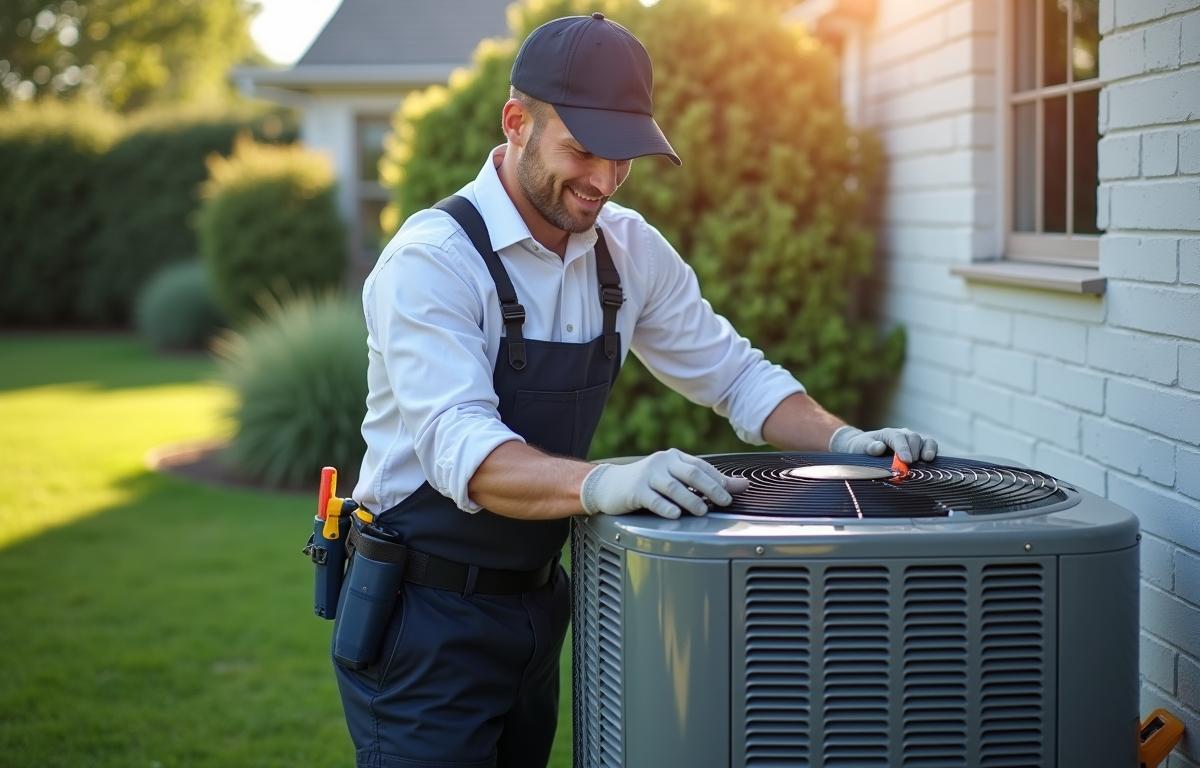
A Practical Guide to Air Conditioner Maintenance for Homeowners
To keep your home comfortable, learn practical tips for air conditioner maintenance today. Many homeowners overlook small issues, which can develop into bigger problems if left unchecked. Taking a few easy measures on a regular basis helps prevent sudden breakdowns, saves money on costly repairs, and creates a healthier indoor environment. By paying close attention to each component of your cooling system, you’ll extend its lifespan and enjoy the best performance possible.
Contents
- 1 The Importance of Regular Care
- 2 AC Unit Cleaning and Filter Replacement
- 3 Seasonal Maintenance and HVAC Upkeep
- 4 Checking Refrigerant Levels and Coil Cleaning
- 5 Thermostat Calibration for Better Energy Efficiency
- 6 System Inspection, Compressor Check, and Fan Operation
- 7 The Role of Ductwork Inspection and Drain Line Maintenance
- 8 Professional Servicing for Long-Term Cooling System Optimization
- 9 Smart Ways to Keep Your AC Running Smoothly
The Importance of Regular Care
Routine checkups form the backbone of effective HVAC maintenance. Even if things seem fine, some subtle indicators, like odd noises or reduced cooling, might signal underlying troubles. Scheduling a cooling system checkup each season ensures that any minor malfunction is caught early before it evolves into something more serious.
A consistent maintenance schedule also preserves overall energy efficiency. When your AC runs at peak performance, it cools your home more effectively and uses less energy, reducing monthly bills and helping the environment. Small tasks, such as filter replacement, keep airflow optimization in check and prolong the unit’s operational life.
AC Unit Cleaning and Filter Replacement
One of the most straightforward methods to improve indoor air quality is regular AC unit cleaning. A buildup of dust and debris can block vital pathways and cause the system to work harder than necessary. This extra strain affects cooling effectiveness and can lead to cost-effective repairs down the line.
Filter replacement is a quick fix that makes a substantial difference. Swap out dirty or clogged filters every few months, or more often if you have pets or live in a dusty area. Doing so not only enhances airflow but also helps remove pollutants, which leads to fewer allergens floating around. This simple step can drastically improve both indoor comfort and the longevity of your unit.
Spotting Dust and Debris
When performing AC unit cleaning, keep an eye out for visible dust accumulations, especially around vents or coils. These spots often indicate where airflow might be restricted, so clearing them away can boost cooling system optimization. For stubborn debris, a soft brush or a vacuum attachment works wonders.
Seasonal Maintenance and HVAC Upkeep
Seasonal maintenance checks are vital for preventing sudden hiccups that could leave you sweating in the middle of a heatwave. During a seasonal checkup, homeowners often overlook parts like the condenser and evaporator coils. Coil cleaning should be part of your routine, ensuring your air conditioner operates efficiently.
Regular HVAC service is also helpful for extending your AC system lifespan. Professionals can pinpoint issues like low refrigerant levels or a failing blower motor service in the earliest stages. This prevents more serious and expensive complications and gives you peace of mind during peak usage months.
Preparing for Different Seasons
Your maintenance approach may vary slightly from spring to fall. In spring, clear any debris that may have built up over the winter months. In late summer or early fall, pay close attention to possible wear and tear as your unit might have been running at full capacity for weeks on end.
Checking Refrigerant Levels and Coil Cleaning
Refrigerant levels must be correct for your AC to function optimally. If they’re too low, your system can freeze, produce insufficient cooling, or even damage the compressor. It’s wise to have a professional servicing session if you notice fluid leaks or a sudden drop in efficiency.
Coil cleaning is another important task that pairs well when checking refrigerant. Dirty coils force your system to expend extra energy, leading to higher utility bills and reduced performance. A gentle spray of water and a soft brush can remove dirt. If you’re dealing with severe buildup, seeking an air conditioner tune-up from a licensed technician is the safest approach.
Avoid DIY Coolant Repairs
While some tasks like debris removal are great for do-it-yourself enthusiasts, handling refrigerant adjustments requires specialized knowledge. If you suspect a leak or suspect your refrigerant levels aren’t correct, consult a professional who offers compressor inspection and condenser maintenance.
Thermostat Calibration for Better Energy Efficiency
Thermostat calibration can fine-tune temperature control and ensure your cooling system runs at its best. If the thermostat isn’t reading indoor temperatures accurately, it may cause frequent cycling or uneven cooling. A quick check using a separate thermometer can reveal any discrepancies that need adjusting.
Upgrading to a smart thermostat integration is another way to improve energy efficiency. This device learns your schedule and optimizes settings automatically. By matching your living habits, it reduces unnecessary cooling, which lowers utility bills over time. Frequent thermostat calibration also impacts fan operation, preventing your unit from overworking and maintaining a balanced indoor climate.
Optimal Thermostat Settings
Many homeowners keep their thermostats at the same setting year-round, but slight adjustments can help with noise reduction and cost-effective repairs. If you’re at work or away for an extended period, set it a few degrees higher to give your system a break. Then, dial it down when you’re home to ensure a comfortable environment without running the AC at full blast 24/7.
System Inspection, Compressor Check, and Fan Operation
A thorough system inspection covers essential elements like the blower motor, condenser, and compressor. The compressor check identifies potential threats that might lead to big repairs if overlooked. An efficient compressor is critical for circulating refrigerant and removing heat from your home.
Fan operation is equally vital, as fans draw in warm air and push out cooled air. A misaligned or worn-out fan can make your system loud and inefficient. If you hear rattling or feel weak airflow, investigate the fan motor and blades before the issue spirals into a major malfunction. Early detection of fan-related problems can keep your entire unit in top shape and lower your chances of needing frequent home cooling maintenance.
Steps to Evaluate Fan Issues
When listening for unusual sounds, switch the AC on, and move from room to room to determine if any vents sound odd. Also, watch for inconsistent airflow, especially if certain rooms aren’t getting as cool as others. If you do detect a problem, schedule a full air conditioner tune-up to address it promptly.
The Role of Ductwork Inspection and Drain Line Maintenance
Airflow is only as effective as the pathways delivering it. Ductwork inspection can reveal leaks or blockages that waste cooled air and raise energy costs. Over time, tiny gaps form along the ducts, lowering the overall performance of your air conditioner. By sealing these leaks, you keep cooled air where it’s supposed to be.
Drain line maintenance keeps your system from succumbing to water leaks or mold growth. A clogged drain line can back up, leaking water into your AC cabinet or even pooling around the unit. Although clearing the drain line is often a simple task, neglecting it can cause major headaches. To maintain indoor air quality, flush the drain line periodically with a mild solution that removes any algae or sediments.
Checking for Moisture Buildup
Too much humidity can trigger discomfort and reduce indoor air quality. If you sense musty odors or see condensation near vents, examine the drain line and look for clogs. A quick cleaning might clear the problem and keep moisture under control.
Professional Servicing for Long-Term Cooling System Optimization
While do-it-yourself routines help maintain day-to-day performance, sometimes only professional servicing will safeguard your AC’s peak functionality. Experts can diagnose subtle issues that aren’t always visible and know how to implement cost-effective repairs. They check everything from refrigerant levels to airflow optimization techniques that let your system run smoothly.
Professional visits also include thorough coil cleaning, compressor inspection, and any specialized task that might be difficult for a homeowner. Trained technicians can evaluate your system’s age and current condition. This insight helps you decide on the right type of preventative maintenance that aligns with your cooling needs and long-term plans.
Extending Your System’s Lifespan
If your AC is nearing its expected end, good maintenance can still provide a few extra seasons of reliable performance. Consistent care, along with regular HVAC service, postpones expensive replacements and gives you time to plan any upgrades. Whether you’re eyeing a high-efficiency system or simply want to maintain what you have, a professional perspective ensures you’ll get the most out of your unit.
Smart Ways to Keep Your AC Running Smoothly
Smart thermostat integration, routine ductwork inspection, and timely filter replacement are just a few ways to enhance daily comfort. Even the smallest improvements in energy efficiency add up over time. You’ll notice lower utility bills, fewer sudden repairs, and a pleasant indoor environment year-round.
Engaging in air conditioner tune-up sessions on a planned schedule ensures consistent performance. This strategy combines both preventative maintenance tasks you can do and help from specialists who offer deeper insights. By adopting a balanced approach, you’ll manage everything from fan operation to refrigerant levels without feeling overwhelmed.
Emphasizing Noise Reduction
If you notice any rattling or clicking, investigate the source quickly. In many cases, a loose part or misaligned fan blade could be the culprit. Promptly tightening a loose screw or realigning a fan saves you from more serious damage that might develop if left unchecked. Addressing noise problems also keeps your neighbors happy and maintains a peaceful indoor atmosphere.
Staying on top of your air conditioner maintenance doesn’t just ensure comfort today—it also promotes better efficiency and reduces stress on expensive parts. By sticking to regular checks, cleaning coils, routinely inspecting your ductwork, and seeking professional help when needed, you’re preserving the health of your cooling system and setting yourself up for hassle-free summers.


